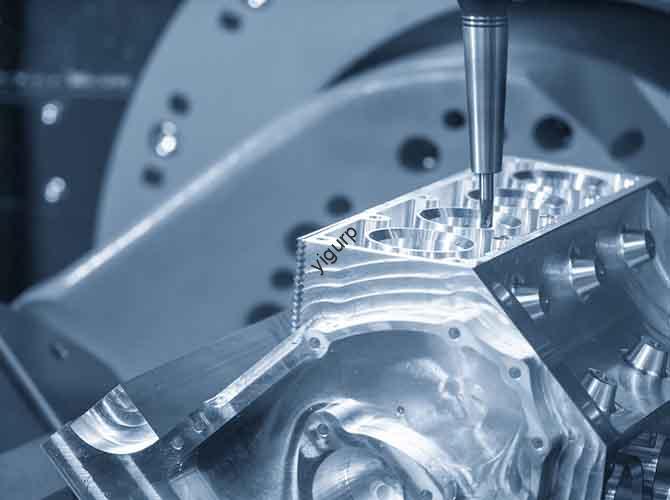CNC (Computer Numerical Control) machining relies heavily on the right choice of metal materials to achieve high precision, durability, and performance. Different metals have unique properties that make them suitable for specific industries—from aerospace to electronics, medical devices to automotive. Below is a detailed breakdown of the most common metal materials for CNC machining, their key traits, applications, and selection guidance.
1. Key Properties of Common CNC Machining Metals (Comparison Table)
To quickly compare core characteristics, here’s a summary of 10 widely used metals:
| Metal Material | Density (g/cm³) | Strength Level | Machinability | Corrosion Resistance | Cost Range |
| Aluminum Alloy | 2.7 | Medium-High | Excellent | Good | Low-Medium |
| Stainless Steel | 7.9 | High | Poor | Excellent | Medium |
| Carbon Steel | 7.85 | High | Average | Poor (needs coating) | Low |
| Copper & Alloys | 8.9 | Low-Medium | Good | Good | Medium |
| Titanium & Alloys | 4.5 | Very High | Very Poor | Excellent | Very High |
| Nickel-Based Alloys | 8.1-8.5 | Very High | Very Poor | Excellent | Very High |
| Magnesium Alloy | 1.8 | Medium | Good | Poor (needs coating) | Medium |
| Tungsten Steel (Carbide) | 14.0-15.0 | Extremely High | Very Poor | Excellent | High |
| Zinc Alloy | 6.6-6.9 | Low | Excellent | Good | Low |
| Beryllium Copper | 8.25 | High | Good | Good | High |
2. Detailed Breakdown of Common Metals (with Models & Applications)
Each metal material has distinct advantages and ideal use cases. Below is a linear breakdown of their properties, popular models, and real-world applications:
2.1 Aluminum Alloy
Why choose it? It is the most widely used material in CNC machining due to its lightweight (1/3 the density of steel) and excellent machinability—tools stay sharp longer, and complex parts (like aircraft frames) can be produced efficiently.
Key models:
- 6061: Heat-treatable, with balanced strength and weldability (used for automotive parts, electronics enclosures).
- 7075: Ultra-high strength (5x stronger than 6061) for high-stress scenarios (aerospace components, bike frames).
- 5052: Rust-resistant, ideal for marine or chemical equipment parts.
2.2 Stainless Steel
Why choose it? Its superior corrosion resistance makes it indispensable for harsh environments (e.g., saltwater, chemicals). However, its high hardness leads to fast tool wear, requiring specialized cutting tools.
Key models:
- 304: General-purpose (food machinery, kitchen appliances) due to good rust resistance.
- 316: Added molybdenum for enhanced corrosion resistance (marine parts, medical implants).
- 17-4PH: Martensitic stainless steel that hardens with heat treatment (valves, pumps).
2.3 Carbon Steel
Why choose it? It offers high strength at a low cost, making it a budget-friendly option for structural parts. The downside? It rusts easily—so surface treatments (electroplating, painting) are a must.
Key models:
- Q235: Ordinary structural steel (brackets, frames for industrial machines).
- 45# Steel: High-quality carbon steel (after quenching/tempering, used for gears, shafts).
- C45: European standard equivalent to 45# Steel (versatile for mechanical parts).
2.4 Other Essential Metals
- Copper & Alloys: Unmatched electrical/thermal conductivity (used for heat sinks, electrical connectors). Popular models: T2 pure copper (wires), H62 brass (plumbing fittings).
- Titanium & Alloys: The “aerospace metal”—high strength + lightweight (used for jet engine parts, medical implants). Key model: Ti-6Al-4V (most widely used titanium alloy).
- Zinc Alloy: Low melting point, ideal for die-casting (toys, decorative parts). Common model: Zamak 3 (good fluidity).
3. How to Select the Right Metal for CNC Machining?
Choosing the wrong material wastes time and money. Follow this 3-step guide to match your needs:
Step 1: Prioritize Application Requirements
- Need lightweight + strength? Choose aluminum alloy (aerospace/automotive) or titanium alloy (high-end medical).
- Need conductivity? Copper alloys (electronics, heat sinks) are unbeatable.
- Need corrosion resistance? Stainless steel (316 for marine) or nickel-based alloys (extreme temperatures).
Step 2: Consider Machinability
- Easy-to-machine materials (aluminum, copper, zinc): Best for complex parts (e.g., 3C product casings) because they reduce tool costs and production time.
- Difficult-to-machine materials (stainless steel, titanium): Require high-precision CNC machines and coated tools—use only for high-stress or harsh-environment parts (e.g., medical implants).
Step 3: Balance Cost
- Low-cost options: Carbon steel (structural parts), aluminum alloy (general components).
- High-cost options: Titanium alloy (aerospace), nickel-based alloys (gas turbines)—reserve for applications where performance is non-negotiable.
4. Yigu Technology’s Perspective
At Yigu Technology, we believe the success of CNC machining starts with material selection. Over the years, we’ve supported clients in aerospace, medical, and automotive industries by matching them with optimal metals—for example, using Ti-6Al-4V for lightweight medical implants and 6061 aluminum for cost-effective automotive parts. We also invest in advanced cutting tools (e.g., carbide tools for stainless steel) to overcome machinability challenges. For clients, the goal isn’t just to “machine a part”—it’s to choose a material that maximizes performance while controlling costs. We recommend starting with a clear list of application needs (strength, environment, budget) to narrow down options quickly.
5. FAQ (Frequently Asked Questions)
- Q: Which metal is best for CNC machining complex, lightweight parts?
A: Aluminum alloy (e.g., 6061) is ideal—it has excellent machinability for complex shapes and is lightweight, making it perfect for electronics or automotive components.
- Q: Do I need surface treatment for carbon steel in CNC machining?
A: Yes. Carbon steel has poor corrosion resistance, so surface treatments like electroplating (for rust protection) or painting (for aesthetics) are required to extend the part’s lifespan.
- Q: Why is titanium alloy more expensive than other metals for CNC machining?
A: Titanium alloy has very high strength and corrosion resistance, but it is extremely difficult to machine—tools wear out quickly, and production takes longer. These factors (material cost + machining time) drive up the overall cost.
